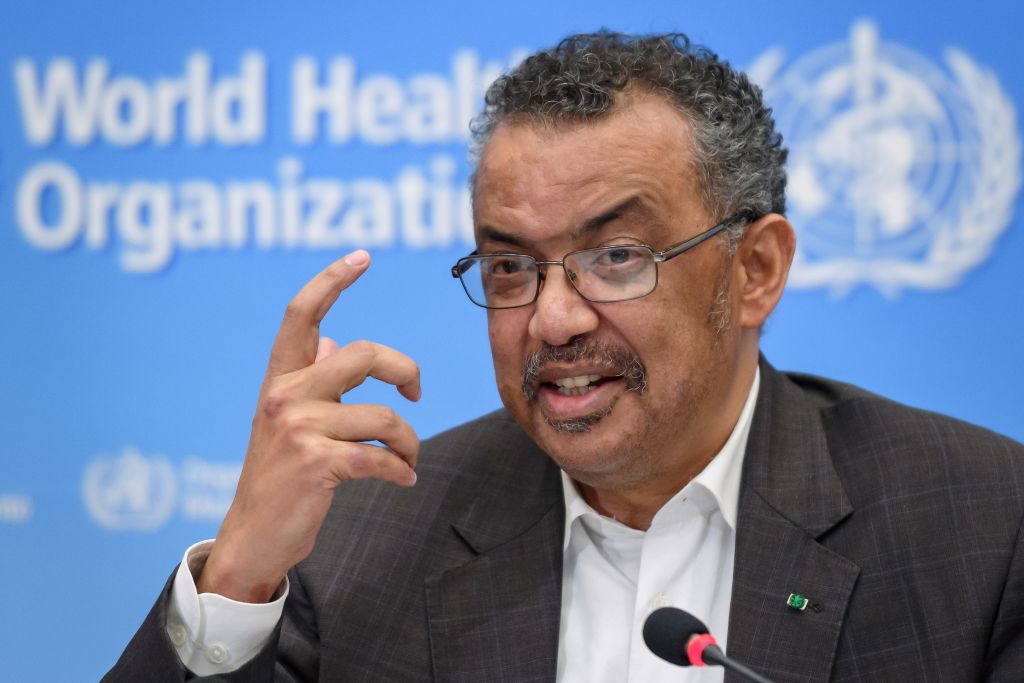U.S. refuses to join 170 countries teaming up to produce a coronavirus vaccine


A free daily email with the biggest news stories of the day – and the best features from TheWeek.com
You are now subscribed
Your newsletter sign-up was successful
The U.S. isn't interested in the rest of the world's brainpower — and manufacturing power — when it comes to developing a COVID-19 vaccine.
More than 170 countries are considering joining the COVID-19 Vaccines Global Access Facility, or Covax, aimed at quickly developing a coronavirus vaccine and distributing it to the most vulnerable populations. But the Trump administration said Tuesday it won't be joining them, in part because the World Health Organization is helping to lead the coalition, The Washington Post reports.
Several U.S. allies, including Japan and Germany, are on board to join the program led by the WHO, the Coalition for Epidemic Preparedness Innovations, and the vaccine alliance Gavi. But the U.S. is still seemingly blaming China and the WHO for coronavirus' global spread and is taking it out on Covax. White House spokesperson Judd Deere said the U.S. would work with other countries in its vaccine development efforts, "but we will not be constrained by multilateral organizations influenced by the corrupt World Health Organization and China."
The Week
Escape your echo chamber. Get the facts behind the news, plus analysis from multiple perspectives.

Sign up for The Week's Free Newsletters
From our morning news briefing to a weekly Good News Newsletter, get the best of The Week delivered directly to your inbox.
From our morning news briefing to a weekly Good News Newsletter, get the best of The Week delivered directly to your inbox.
The decision is in line with Trump's "America first" mentality, the Post reports, just like its decision to withdraw from the WHO in the first place. It suggests the U.S. is confident it will develop a vaccine early, and would rather not put its confidence in other countries or necessarily share whatever vaccine it develops with them. But "just from a simple risk management perspective, this is shortsighted," Kendall Hoyt, an assistant professor at Dartmouth's Geisel School of Medicine, said, likening it to "opting out of an insurance policy."
Suerie Moon, the co-director of the Global Health Center at the Graduate Institute of International and Development Studies in Geneva, added that this "will have political repercussions beyond public health." It'll show the rest of the world whether the U.S. is "a reliable partner," or if America's mentality is about "keep[ing] all your toys for yourself."
A free daily email with the biggest news stories of the day – and the best features from TheWeek.com
Kathryn is a graduate of Syracuse University, with degrees in magazine journalism and information technology, along with hours to earn another degree after working at SU's independent paper The Daily Orange. She's currently recovering from a horse addiction while living in New York City, and likes to share her extremely dry sense of humor on Twitter.
-
 The Olympic timekeepers keeping the Games on track
The Olympic timekeepers keeping the Games on trackUnder the Radar Swiss watchmaking giant Omega has been at the finish line of every Olympic Games for nearly 100 years
-
 Will increasing tensions with Iran boil over into war?
Will increasing tensions with Iran boil over into war?Today’s Big Question President Donald Trump has recently been threatening the country
-
 Corruption: The spy sheikh and the president
Corruption: The spy sheikh and the presidentFeature Trump is at the center of another scandal
-
 Trump HHS slashes advised child vaccinations
Trump HHS slashes advised child vaccinationsSpeed Read In a widely condemned move, the CDC will now recommend that children get vaccinated against 11 communicable diseases, not 17
-
 FDA OKs generic abortion pill, riling the right
FDA OKs generic abortion pill, riling the rightSpeed Read The drug in question is a generic version of mifepristone, used to carry out two-thirds of US abortions
-
 RFK Jr. vaccine panel advises restricting MMRV shot
RFK Jr. vaccine panel advises restricting MMRV shotSpeed Read The committee voted to restrict access to a childhood vaccine against chickenpox
-
 Texas declares end to measles outbreak
Texas declares end to measles outbreakSpeed Read The vaccine-preventable disease is still spreading in neighboring states, Mexico and Canada
-
 RFK Jr. shuts down mRNA vaccine funding at agency
RFK Jr. shuts down mRNA vaccine funding at agencySpeed Read The decision canceled or modified 22 projects, primarily for work on vaccines and therapeutics for respiratory viruses
-
 Measles cases surge to 33-year high
Measles cases surge to 33-year highSpeed Read The infection was declared eliminated from the US in 2000 but has seen a resurgence amid vaccine hesitancy
-
 Kennedy's vaccine panel signals skepticism, change
Kennedy's vaccine panel signals skepticism, changeSpeed Read RFK Jr.'s new vaccine advisory board intends to make changes to the decades-old US immunization system
-
 Kennedy ousts entire CDC vaccine advisory panel
Kennedy ousts entire CDC vaccine advisory panelspeed read Health Secretary RFK Jr. is a longtime anti-vaccine activist who has criticized the panel of experts
